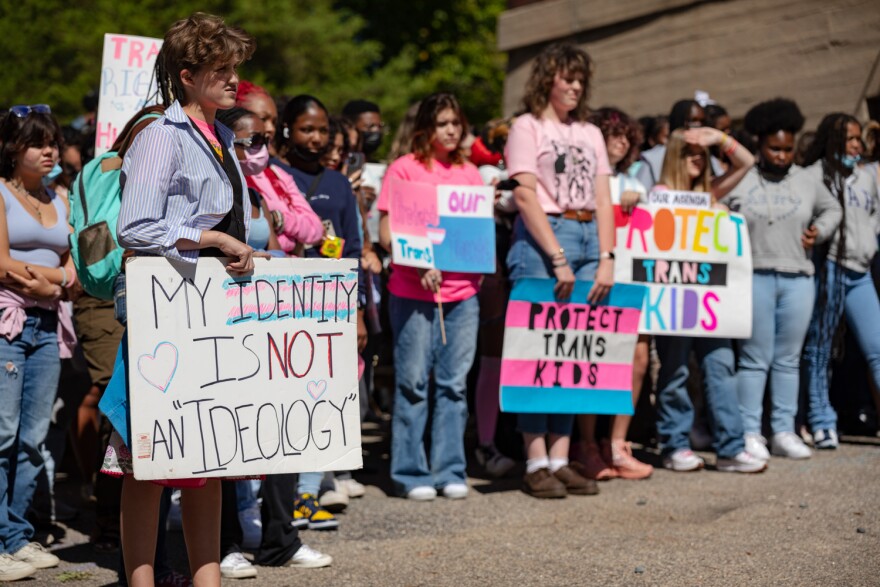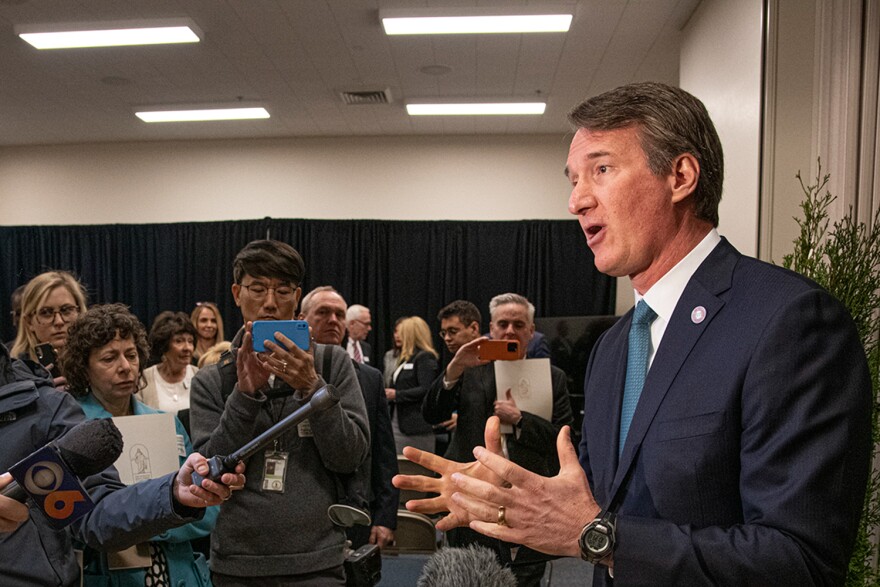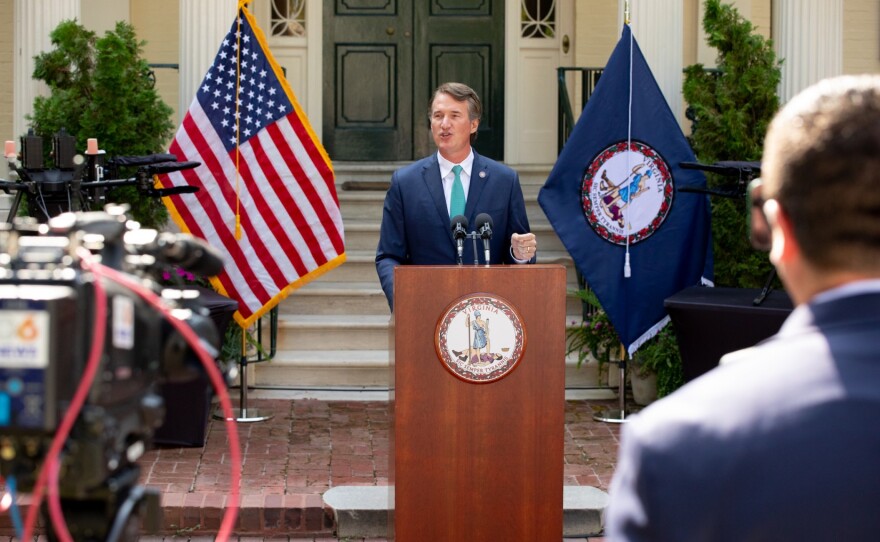Editor’s note: VPM News and Staff Reporter Ben Paviour filed suit in January in Richmond City Circuit Court against the Virginia Department of Education for public release of these policies in draft form. Both were represented by the Reporters Committee for Freedom of the Press. Read more about the case.
Icarus Landaker graduated last spring from Princess Anne High School in Virginia Beach. They first came out as nonbinary to an English teacher, who was supportive. In fact, Landaker says the whole school was a great, safe place for a student to explore their gender identity. Their family needed more time, though.
“It was a rocky start. I will admit, my parents were not fully accepting,” they said. “They’ve become more accepting, and they have started to turn that corner.”
Landaker described feeling “a bolt of fear” when Gov. Glenn Youngkin’s administration proposed new model policies for transgender and nonbinary students back in 2022.
Tens of thousands of public comments poured in, and the majority of those were opposed to the changes.
A big concern for Landaker was that these policies would encourage staff to “out” trans and nonbinary students to parents who may not be supportive. In response to that, Landaker joined students who walked out of school in protest. They also attended school board meetings to voice concerns.
“Leave us alone, let us be kids. Because that’s all we are. We’re just students who want to go to school, to make friends, to learn, to explore who we are,” Landaker told VPM News. “We do not need administration and higher powers limiting who we are and shutting doors that we want to walk through.”
This week, the Virginia Department of Education released its third iteration of those same model policies in as many years. And the “Model Policies on Ensuring Privacy, Dignity, and Respect for All Students and Parents in Virginia’s Public Schools” are much more like the 2022 Youngkin-led version Landaker feared than the 2021 regulations former Gov. Ralph Northam’s administration made.
Pro-transgender rights advocates say the new version focuses heavily on the authority of parents — and not their children — in ways that could seriously hurt trans and nonbinary students in practice. But conservative organizations are calling them a win for parents, free speech and freedom of religion in public schools.
Shannon McKay, executive director of the advocacy group He She Ze and We, says the new policies do appear inclusive at first blush.
“This is gonna fool a lot of people into thinking that this is a good thing,” she said. “If you actually read it, it should be a good thing — if it truly included all students.”
The catch, according to McKay and others, is in the draft version VDOE includes.
There lies the more divisive and partisan language, including a scientifically outdated focus on “biological sex” in referring to a person’s sex assigned at birth; the absence of acknowledgment of gender identities beyond he and she (a focus that outright excludes nonbinary, intersex and other individuals); and a heavy reliance on what any individual student’s legal paperwork — birth certificate, driver’s license, passport or military ID — states.
That last one, McKay says, is particularly critical and harmful because it forces children and their families to “rush” an already confusing and arduous journey.
“The outside world thinks that you know, a kid comes out and says, ‘I'm trans,’ and all of a sudden all of these things get put into place,” McKay said. “We shouldn't also make these families rush to update documents, legal documents, because they're afraid their kids are not going to be respected at school.”
To her, these policies involve a series of choices that aren't rooted in respect, dignity or the best interest of students' education because "no one is trying to change anyone's belief system by being who they are."
"We all can choose whether or not we're gonna leave our biases at the door and serve all of the students that are in front of us. And that is the job of a school, a public school," McKay said.
"Everyone involved with creating policy for schools, they need to realize that puts a student under tremendous stress," she continued, "but are they going to be able to learn? And my answer would be no, and I'm a former educator ... When children are under a tremendous amount of stress, they are not going to do their best at school."

Who's in favor?
In short, the state government as led by Youngkin — as well as politically conservative organizations — like these new rules because they highlight the rights of “all” students and the innate authority of their parents or legal guardians.
That’s clear from the document’s opening paragraphs: “All students have the right to attend school in an environment free from discrimination, harassment, or bullying. … The Department also fully acknowledges the rights of parents to exercise their fundamental rights protected by the Fourteenth Amendment of the U.S. Constitution to direct the care, upbringing, and education of their children.”
As Superintendent of Public Instruction Lisa Coons said in VDOE’s press release, “We are elevating parents and giving them a seat at the table.”
Virginia parents have had a “fundamental right” to make decisions concerning their children enshrined in state code since 2013. “Parental rights” is a reframing of public education that focuses on objecting to teaching cultural issues and sensitive topics — such as systemic racism, sexual orientation, climate change and gender diversity.
Kate Anderson is an attorney at Alliance Defending Freedom and director of its Center for Parental Rights. ADF supports the new policies, and one of her biggest concerns is that parents nationwide are losing their rights and responsibilities over their child’s upbringing.
In VDOE’s press release, Education Secretary Aimee Guidera echoes the sentiment of shoring up parents’ rights: “These policies clarify that parents are the appropriate decision makers regarding their child’s health and wellbeing, and that students are best served when parents, teachers, and school administrators work as a team to support a child’s education.”
“This is really about parents being able to walk through this issue with their kids on an individual basis and decide what’s best for them. Whatever that is,” Anderson said.
Anderson says these new regulations address that disparity.
“You have too many schools across the country who are hiding information from parents, lying to parents about how their children are identifying at school,” she said, citing a specific case out of Harrisonburg.
And while the new policies allow school staff to use a student’s preferred pronouns with parents’ permission, it’s not required. Anderson says that is a teacher’s right to free speech — not discrimination.
2021, 2022, 2023: How many model policies are there?
These new policies are VDOE’s third public attempt at writing regulations aimed at transgender and nonbinary students. Attempt No. 1, in 2021, was done with a variety of perspectives during Northam’s administration.
McKay was one of those 2021 version stakeholders. She said that the Northam administration–led working group brought together perspectives from the state and marginalized communities.
“We all worked together to try to put together a comprehensive, you know, policy that would actually protect and support trans and nonbinary students,” McKay said, “and also equip the folks in school personnel who support, who work with them, to know how to do so.”
That’s not what McKay sees in these new, Youngkin-led policies. These are technically the administration’s second attempt; the 2022 model policies — usually referred to as a “draft” — resulted in more than 77,000 public comments and statewide protests from pro-LGBTQ+ organizations.
Wyatt Rolla, the ACLU of Virginia’s senior transgender rights attorney, was disappointed by the new regulations: “It was really not surprising, but nonetheless really horrifying to see that the Youngkin administration disregarded the majority of public comments they received.”
Education organizations have also expressed their unhappiness. In a press release soon after the policies were published, James Fedderman, president of the Virginia Education Association, called them “the intentional targeting of LGBTQ+ students in such a blatant and crass manner.”
Fedderman also pointed out that the latest model policies, which were published solely by the VDOE, may be optional for school boards and school divisions to execute.
“If implemented, these policies would no doubt threaten the safety and well-being of LGBTQ+ students, open the door for bullying, and set back their recent civil rights gains in Virginia,” Fedderman said in the release. “This policy targets a student group already facing significant barriers, offers no measurable benefit, and is simply cruel.”
VEA did not respond to VPM News’ request for additional comment by press time.
Anderson, from the ADF, says that the new policies do have protections for trans and nonbinary students to prevent abuse at home. That’s technically true: In several places throughout the 18-page document, carve-outs are listed for students at imminent risk of suicide and/or who have the attention of mandatory reporters for possible abuse and neglect.
An existing state law passed more than a decade ago requires these exceptions. But that’s on paper, not in practice — which is the whole problem, transgender rights advocates say. And without knowing how it will be practiced, many questions about student safety remain.

What's next?
The required implementation by school divisions is still unclear because of the way the new rules were created, published and disseminated versus the originals. The 2021 model policies were developed in response to identical 2020 General Assembly bills Northam signed into law.
These new 2023 policies note those “promoted a specific viewpoint aimed at achieving cultural and social transformation in schools” and “disregarded the rights of parents and ignored other legal and constitutional principles that significantly impact how schools educate students, including transgender students.”
VDOE formally rescinds those 2021 rules here, “which shall have no further force and effect” and refers to local school boards’ compliance as mandatory. But the new policies include no enforcement mechanism, obvious VDOE point of contact, time limit or penalties.
Craig Konnoth, a chaired professor at the University of Virginia School of Law, says the original policies listed and thanked its creators and major participants from policy and medical expertise.
But he says the 2023 rules have essentially none of that transparency.
“Because unlike the 2021 policies, they don't list any names. They don't cite any expertise. So really, it just seems like naked partisanship, because there's really no reliance on the expert knowledge out there,” he said. “It appears just to be the political whims of the people who were involved in the process, which I think is very concerning in its own right.”
In a brief inline mention, VDOE attributes creation of the 2023 policies to “the result of consultation with educational leaders within the Department and stakeholders throughout the Commonwealth, including the over 70,000 comments submitted on the initial draft of the 2023 Model Policies, taking into account the over 9,000 comments received during the public comment period for the draft 2021 Model Policies, and, most importantly, parents of children in our public schools.”
Konnoth also said that the 2022 draft version Youngkin’s administration made went further than the final 2023 version to prioritize an educator’s fundamental moral and religious beliefs over student or parental preference — and legal precedent.
“The 2021 policies were issued pursuant to legislation that was passed, really, with the intention that transgender students in Virginia be protected, be protected from bullying, have access to restrooms that correspond to their identity, that they get treated with respect by students and teachers alike,” Konnoth said. “And what the Youngkin policies have sought to do consistently is to strip away these protections.”
Trans rights advocates like McKay say the policies do not universally apply to "all" students. Similarly, they say these rules don't apply to "all" parents, either.
"'Schools may not abrogate the rights of parents,'" McKay said. "That includes parents like me. That includes the thousands of families that are in Virginia who have trans and nonbinary students."
VPM News attempted to reach the Virginia Department of Education and Gov. Glenn Youngkin’s office for clarification this week.
VDOE did not answer a list of questions by press time Thursday. A seemingly nonautomated response sent via email on Wednesday said, “Given the volume of requests for information received each day by our office, we will process your request for information as soon as possible.”
The same questions were sent to the governor’s office. A spokesperson for the administration responded via email after a noon deadline on Thursday to some of VPM News’ questions — with specific citations from state code and the policies themselves — but without specifically calling attention to which questions were being answered.
In addition to those citations, the governor’s spokesperson told VPM News via email, “I would encourage you to read the policy” and “School divisions should go out of their way to accommodate their teachers’ sincerely held beliefs not only because it’s the right thing to do, but also because failing to do so raises serious constitutional concerns.”
VPM News reached out to the following organizations for comment: ACLU of Virginia, Alliance Defending Freedom, Do No Harm, Gov. Glenn Youngkin, The Federalist Society, He She Ze & We, Icarus Landaker, Pacific Justice Institute, Side by Side Virginia, Speech First, University of Virginia School of Law, Virginia Department of Education, Virginia Education Association.
Most of these organizations and individuals were involved in the creation of Virginia Department of Education 2021 model policies (downloads a .docx), 2022 model policies draft or the final 2023 model policies.
VPM News questions for VDOE, Gov. Glenn Youngkin
- Are these policies mandatory or optional for local school divisions?
- Do the new model policies need to be voted on by the State Board of Education?
- If yes, when will the board meet to discuss?
- If no, why not?
- What is the enforcement mechanism for VDOE to ensure school divisions adopt these policies at a minimum?
- What is the time limit for school divisions to implement these?
- What resources other than the policies will be provided to school districts in order to implement these?
- Who at VDOE will oversee implementation and enforcement of these policies?
- How will school division staff recognize when they need to “accommodate students with distinctive needs, including transgender students”?
- What kind of workflow is being suggested or planned for implementing that?
- What will be the standard procedure when the distinctive needs of a transgender student conflict with what the model policies refer to as First Amendment rights?
- i.e., deadnaming, use of record pronouns versus preferred pronouns?
- How will school staff be encouraged to handle that when a transgender student has the full-throated support of their parents/legal guardians?












